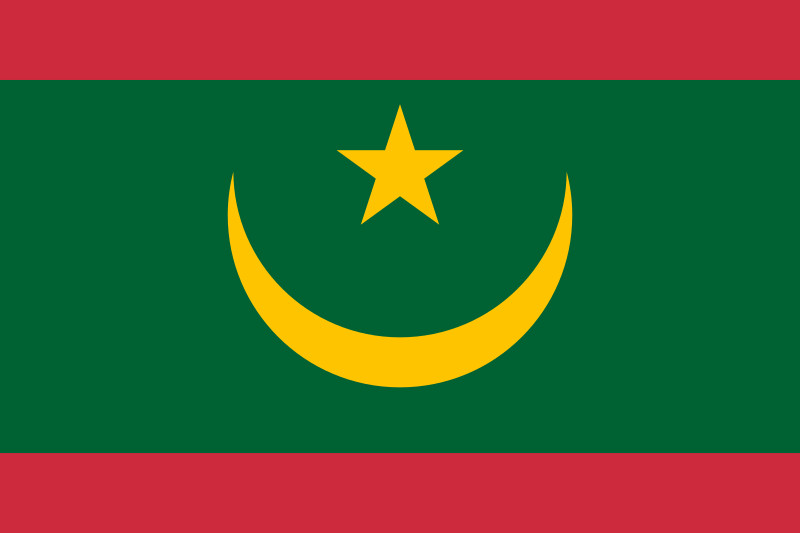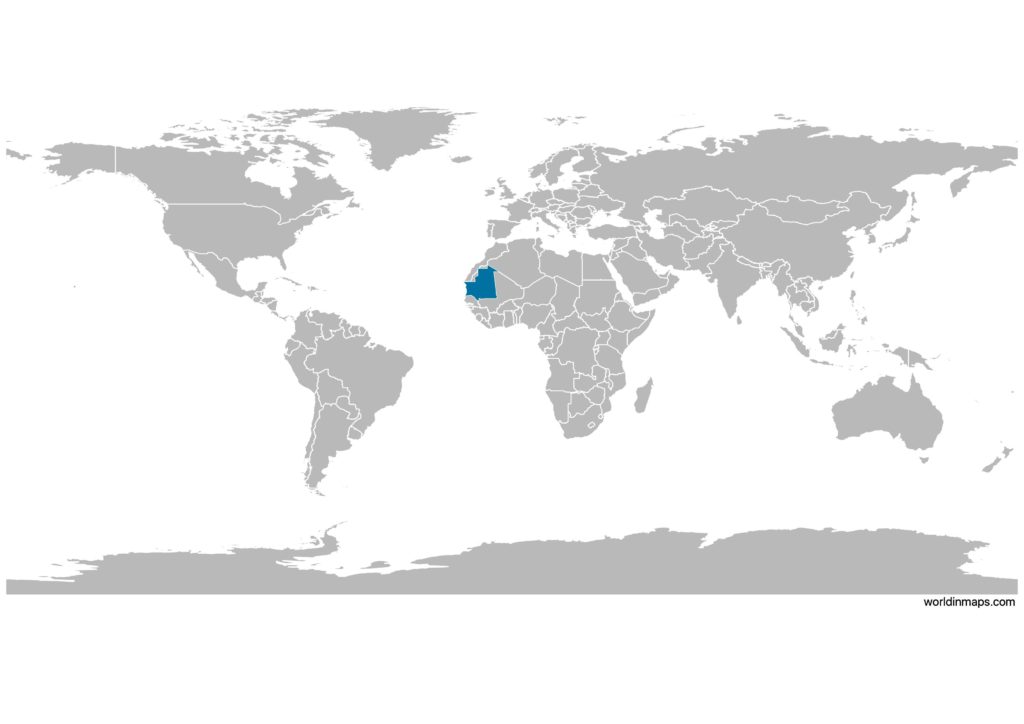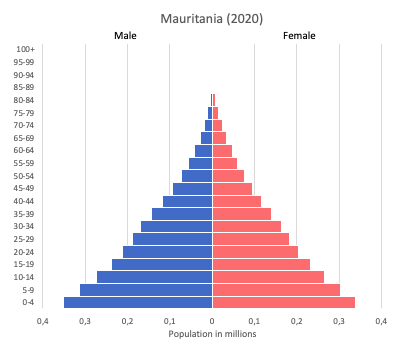Mauritania

| Government | |
| Name | Islamic Republic of Mauritania |
| Arabic | الجمهورية الإسلامية الموريتانية al-Jumhūrīyah al-Islāmīyah al-Mūrītānīyah |
| French | République islamique de Mauritanie |
| Government type | presidential republic |
| Capital | Nouakchott (958,399 (2013)) |
| Currency | Ouguiya (MRU) |
| People | |
| Population (2020) | 4,649,660 (129th) |
| Density of population | 3.4 P/km2 |
| Nationality | Mauritanian |
| Official languages | |
| Arabic | |
| Ethnic groups | |
| black Moors (Haratines – Arab-speaking slaves, former slaves, and their descendants of African origin, enslaved by white Moors) | 40% |
| white Moors (of Arab-Berber descent, known as Beydane) | 30% |
| Sub-Saharan Mauritanians (non-Arabic speaking, largely resident in or originating from the Senegal River Valley, including Halpulaar, Fulani, Soninke, Wolof, and Bambara ethnic groups) | 30% |
| Religions | |
| Muslim (official) | 100% |
| Life expectancy (2020) | |
| Male | 62.1 years |
| Female | 67 years |
| Total population | 64.5 years (201st) |
| Homicides | |
| n.a. | |
| Geography | |
| Land area | 1,030,700 km2 |
| water area | 0 km2 |
| total area | 1,030,700 km2 (30th) |
| Mean elevation | 276m |
| Lowest point | |
| Sebkhet Te-n-Dghamcha | -5 m |
| Highest point | |
| Kediet Ijill | 915 m |
| Land use (2011) | |
| Agricultural land | 38.5% |
| Arable land | 0.4% |
| Permanent crops | 0% |
| Permanent pasture | 38.1% |
| Forest | 0.2% |
| Other | 61.3% |
| Urbanization | |
| Urban population (2020) | 55.3% |
| Rate of urbanization | 4.28% annual rate of change (2015 – 2020) |
| Economy | |
| Labor force (2017) | 1.437 million (133rd) |
| Labor force by occupation (2014) | |
| Agriculture | 50% |
| Industry | 1.9% |
| Services | 48.1% |
| Unemployment rate (2017) | 10.2% (142nd) |
| GDP (PPP) (estimate 2018) | |
| Total | $18.117 billion (134th) |
| Per capita | $4,563 (140th) |
| GDP (nominal) (estimate 2018) | |
| Total | $5.200 billion (154th) |
| Per capita | $1,309 (149th) |
| GDP by sector (estimate 2017) | |
| Agriculture | 27.8% |
| Industry | 29.3% |
| Services | 42.9% |
| Exports (2017) | $1.722 billion (147th) |
| Exports partners (2017) | |
| China | 31.2% |
| Switzerland | 14.4% |
| Spain | 10.1% |
| Germany | 8.2% |
| Japan | 8.1% |
| Imports (2017) | $2.094 billion (166th) |
| Imports partners (2017) | |
| Belgium | 11.5% |
| UAE | 11.3% |
| US | 9.2% |
| China | 7.5% |
| France | 7.4% |
| Netherlands | 6.1% |
| Morocco | 6% |
| Slovenia | 4.8% |
| Vanuatu | 4.7% |
| Spain | 4.7% |
Mauritania on the world map

Mauritania top 10 largest cities (2013)
- Nouakchott (958,399)
- Nouadhibou (118,167)
- Kiffa (50,206)
- Mbera Refugee Camp (47,725)
- Kaédi (45,539)
- Zouérat (44,649)
- Sélibaby (40,281)
- Rosso (33,581)
- Bougadoum (32,749)
- Boutilimit (27,170)
Demography
Population pyramid

Age structure data
Estimate for 2020:
- 0-14 years: 37.56% (male 755,788/female 748,671)
- 15-24 years: 19.71% (male 387,140/female 402,462)
- 25-54 years: 33.91% (male 630,693/female 727,518)
- 55-64 years: 4.9% (male 88,888/female 107,201)
- 65 years and over: 3.92% (male 66,407/female 90,707)
Remark: the age structure of a population affects a nation’s key socioeconomic issues. Countries with young populations (high percentage under age 15) need to invest more in schools, while countries with older populations (high percentage ages 65 and over) need to invest more in the health sector. The age structure can also be used to help predict potential political issues. For example, the rapid growth of a young adult population unable to find employment can lead to unrest.
Population from 1950 to 2020
Source: United Nations, Department of Economic and Social Affairs, Population Division (2019). World Population Prospects 2019, Online Edition. Rev. 1.
Evolution of the life expectancy from 1960 to 2018
Source: World Development Indicators, The World Bank
Economy
Agriculture:
dates, millet, sorghum, rice, corn, cattle, camel and sheep
Industries:
fish processing, oil production, mining (iron ore, gold, copper)
Exports – commodities:
iron ore, fish and fish products, livestock, gold, copper, crude oil
Imports – commodities:
machinery and equipment, petroleum products, capital goods, foodstuffs, consumer goods
Time zone and current time in Mauritania
Go to our interactive map to get the current time in Mauritania